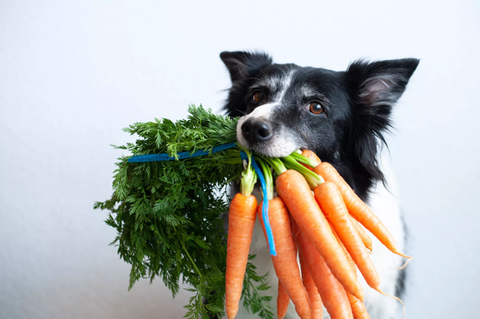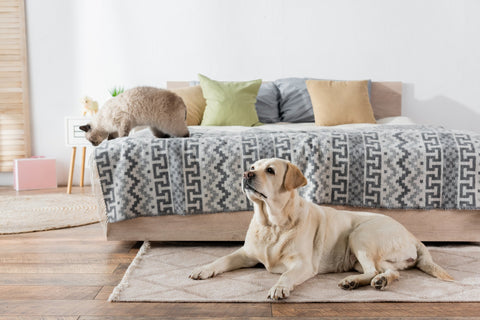If you want to build a better relationship and communication with your dog, you need to be able to identify the different types of dog behaviors they exhibit and understand what these mean.
As dog behaviors tell you so much about your dog’s mood, state of mind, and health condition, you’ll need to be able to find out what causes these and look for ways on how to help them.

"Why do dogs dig? Digging is instinctual dog behavior and is commonly seen in most dogs."
DOG BEHAVIORS AND WHAT THEY MEAN
Dog Chewing
Just like how a child wants to chew on things when a tooth is about to come out, so does your pup. One common dog behavior you will notice in your dog is their chewing. For a pup, chewing is normal and it’s their own way of helping relieve themselves from the pain of teething. But for an adult dog, chewing can be because they enjoy the taste of the object they are chewing, it could be a sign of anxiety, boredom, or a form of relaxation as chewing can calm a dog down.
How to teach your dog not to chew on inappropriate items:
Dog Digging
Why do dogs dig? Digging is instinctual dog behavior and is commonly seen in most dogs. As a matter of fact, dogs dig for a number of reasons: for fun, for anxiety relief, for comfort, protection, for an escape plan, for hiding what’s theirs, for attention, or for hunting prey.
How to stop your dog from too much digging:
- Put on extra efforts to supervise and keep watch of your dog whenever they are out. When you see your dog getting ready to dig, distract them and by practicing recall and rewarding them when they come.
- Your dog likes to dig for entertainment, anxiety relief, or to fulfill their instincts. To help manage overexcitement, you can provide calming supplements. Calming SoftSupps® for dogs has powerful ingredients that will help act as a calming aid without drowsiness. For stressful situations that may cause anxiousness, these calming supplements for dogs can help keep furbabies calm & relaxed.
Panting
Ever wonder why your dog pants? Unlike humans who sweat, dogs expel and regulate their body heat by panting. But it’s also important to observe your dog’s panting as it may indicate pain, discomfort, and worse, heat stroke.
How to help your dog regulate their body heat:
- Make sure your dog is well-hydrated before and after any physical activity.
- Make fresh water always available and accessible.
- Know the physical limitations of your dog and don’t overdo them.
- Avoid extreme temperatures.
Dog Scooting
Have you ever noticed your dog scooting their butt the ground? It may look funny, but this can mean that something is irritating your dogs’s anus, like allergies, anal gland issues, or parasites. It can also mean that your dog is suffering from constipation and is trying their best to express it.
How to help your dog when they are scooting?
- Contact your vet and find out why they are scooting.
- Wipe their butt with Pet WiPees™ Gland wipes.
- Keep their deworming updated to get rid of internal parasites.
- Provide them with easily digestible foods to be able to prevent constipation.
- If your dog suffers from allergies, provide Allergy SoftSupps® daily.
Circling
Your dog who is fond of walking in circles may indicate a health issue. If your furbaby is circling, it might be that their area of confinement is too small, they have ear infections, itchy skin they can’t reach near their backside, and even severe reasons that may include a brain tumor or poisoning. Dog circling can also be considered as a canine compulsive disorder - similar to human obsessive-compulsive disorder in which a dog exhibits repetitive behavior.
How to manage your dog’s circling:
- Consult your vet to be able to have a proper diagnosis on the causes of their circling: maybe it’s because of external and environmental factors, or an anxiety disorder, or a neurological concern, etc.
- Make sure your give your dog plenty of exercise, a healthy diet, activities that will stimulate their mind & body, and giving them an influx of attention and affection.
Peeing and Pooping Accidents
Inappropriate peeing and pooping can be the most frustrating dog behavior, especially if they are potty trained. Aside from the messy cleanups, it also indicates that your dog may have incontinence, urinary health problems, anxiety, lack of proper housebreaking training.
How to prevent inappropriate peeing and pooping:
- Take your dog to the vet to see if there is a medical issue like incontinence, a UTI, or a bladder infections. accidents are common. If you are dealing with an issue that makes your dog unable to control their bladder or bowels properly, Pet Parents® Dog Diapers or Belly Bands to help you deal with accidents and steer clear of messy cleanups.
- Help support your dog's bladder health by providing them bladder supplements like Bladder SoftSupps® that will favorably strengthen your dog’s bladder health.
- Give them Probiotic SoftSupps® that contains a powerful 5-strain proprietary probiotic blend that aids in digestion and proper absorption of nutrients and minerals. It has no fillers and is meticulously formulated to help shape your dog's gut health.
Some dog behaviors are a dog’s natural instincts while some are not and can even indicate a health problem. This is why it’s very important to interpret and understand a dog's behavior well, for a happier and healthier life. Because as they say, a dog’s actions speak a thousand words—but interpreting them correctly is a learned skill.
"Help support your dog's bladder health by providing them bladder supplements like Bladder SoftSupps® that will favorably strengthen your dog’s bladder health."










